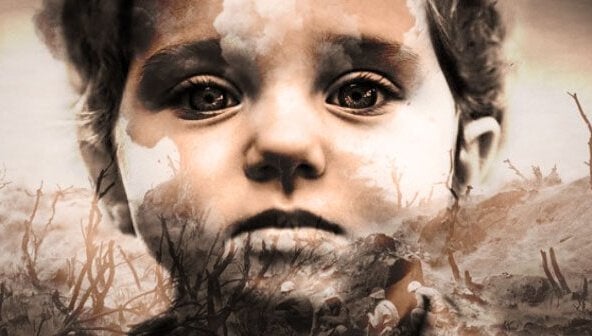Transgenerational trauma is an impact, a transfer in which the emotional, physical or social pain experienced by a person at a given time is transmitted to new generations in a way that goes far beyond the mere behavior learned. We are talking mainly about epigenetics and how the influence of the environment can alter the expression of certain genes.
The subject is not new. In fact, transgenerational or intergenerational trauma originated in a Study of World War II, it was during this period that several studies were able to see how generations following Holocaust survivors exhibited certain behaviors (nightmares, emotional and behavioral problems) in which it was evident that the original trauma of grandparents was still present in various ways in their grandchildren.
- “The mind develops.
- Like the body.
- Through internal growth.
- Environmental influence and education.
- Its development may be inhibited by physical illness or trauma.
- -Umberto Eco-.
We can say, without a doubt, that all this can be determined by the style of creation and by the educational standard, by the weight of memory and by the conscious or unconscious narrative that surrounds all family dynamics. A dynamic in which the past is still present in many ways, however, it is something that goes further, it is something that, as we have already said, can even reach the genetic level.
For example, consider the effect that may be associated with malnutrition, let us also think about the genetic impact that can cause fear and suffering expressed in high levels of cortisol that, for several years, continue to cause problems in an organism. Are we also going to think about traumas that sometimes don’t channel, aren’t rejected, and become post-traumatic stress disorder and chronic depressive states?
Later generations of the person who suffered the initial trauma will not necessarily develop the same disorders, but will be much more vulnerable to anxiety, stress and depression than others. Let’s take a closer look.
Andrea was sexually abused by a relative for much of her childhood and adolescence, growing up in an unstructured environment, where her mother was also abused as a child, as soon as she could leave this environment, when she was mostly older, she refused to receive psychological support to deal with this trauma. I just wanted to forget, get over the page as fast as I could.
Marks and wounds remain dormant in several ways: anxiety, eating disorders, low self-esteem, hypervigilance, depression, insomnia . . . To these factors is added a weak immune system, with weak defenses, making you a person prone to infections, flu, allergies?
Andrea now has a 7-year-old boy. It’s your reason for being and your world, found your child’s stability and strength, as well as a reason to take more care of himself, yet he realizes that his son’s education is getting more and more complicated: he sleeps poorly, he has attention problems, he has many tantrums and difficult behaviors. When she is called to school, Andrea feels that her role as a mother is being questioned to the point where she feels clear that she is “doing something wrong. “
The last thing our protagonist should do is doubt herself as a mother. Peter Lowenberg, a psychohistoryist and professor at the University of California, is one of the leading experts in the study of transgenerational trauma and explains that un learned pain and traumatic events have an impact on subsequent generations in various ways.
We were all taught at school that we receive the genes of our mother and father and that this genetic material defines our physical traits, our intelligence in part and even our tendency to inherit certain diseases, however, assuming that trauma as such is also inscribed chromosomes of the same family lineage is undoubtedly something very difficult to believe.
Epigenetics has taken a qualitative leap from the more orthodox genetics to explain various phenomena, the first is that our way of life, the environment in which we live, our diet and even some traumatic events can produce genetic changes in our offspring.
This is explained by a little boy? Label a chemical called an epigenome. What this little element does is as fascinating as it is shocking: it changes the expression of certain genes according to the variables mentioned above.
Several scientists at Mount Sinai Hospital have shown that the effects of post-traumatic stress on Holocaust survivors have activated this epigenome that can alter a person’s genetic expression. This traumatic brand has been passed on to later generations in several ways.
However, as we said at the beginning of the article, this does not mean that the transgenerational trauma experienced by our parents or grandparents will determine us 100%, what is the greatest chance of suffering from depression, anxiety, sleep disorders, emotional problems, hyperactivity?
So what Andrea, in our example, should try to do is first find the right mechanisms and strategies to deal with her past and overcome this trauma. The strength gained in this process will allow you to do everything possible to meet your needs and work on your behavior, as well as make you a strong, happy and emotionally mature person.

